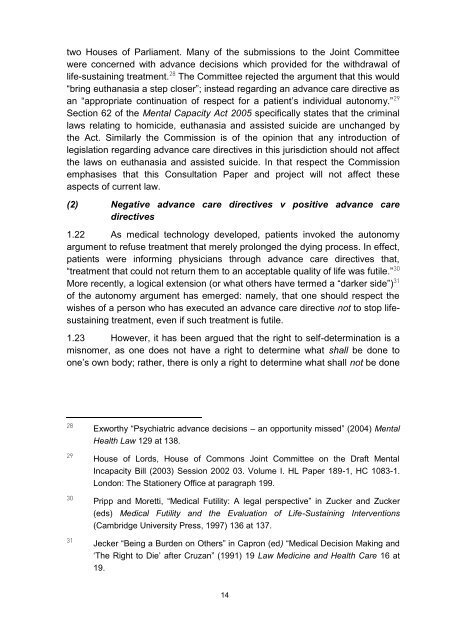Consultation Paper on Bioethics - Law Reform Commission
Consultation Paper on Bioethics - Law Reform Commission
Consultation Paper on Bioethics - Law Reform Commission
Create successful ePaper yourself
Turn your PDF publications into a flip-book with our unique Google optimized e-Paper software.
two Houses of Parliament. Many of the submissi<strong>on</strong>s to the Joint Committee<br />
were c<strong>on</strong>cerned with advance decisi<strong>on</strong>s which provided for the withdrawal of<br />
life-sustaining treatment. 28 The Committee rejected the argument that this would<br />
“bring euthanasia a step closer”; instead regarding an advance care directive as<br />
an “appropriate c<strong>on</strong>tinuati<strong>on</strong> of respect for a patient‟s individual aut<strong>on</strong>omy.” 29<br />
Secti<strong>on</strong> 62 of the Mental Capacity Act 2005 specifically states that the criminal<br />
laws relating to homicide, euthanasia and assisted suicide are unchanged by<br />
the Act. Similarly the Commissi<strong>on</strong> is of the opini<strong>on</strong> that any introducti<strong>on</strong> of<br />
legislati<strong>on</strong> regarding advance care directives in this jurisdicti<strong>on</strong> should not affect<br />
the laws <strong>on</strong> euthanasia and assisted suicide. In that respect the Commissi<strong>on</strong><br />
emphasises that this <str<strong>on</strong>g>C<strong>on</strong>sultati<strong>on</strong></str<strong>on</strong>g> <str<strong>on</strong>g>Paper</str<strong>on</strong>g> and project will not affect these<br />
aspects of current law.<br />
(2) Negative advance care directives v positive advance care<br />
directives<br />
1.22 As medical technology developed, patients invoked the aut<strong>on</strong>omy<br />
argument to refuse treatment that merely prol<strong>on</strong>ged the dying process. In effect,<br />
patients were informing physicians through advance care directives that,<br />
“treatment that could not return them to an acceptable quality of life was futile.” 30<br />
More recently, a logical extensi<strong>on</strong> (or what others have termed a “darker side”) 31<br />
of the aut<strong>on</strong>omy argument has emerged: namely, that <strong>on</strong>e should respect the<br />
wishes of a pers<strong>on</strong> who has executed an advance care directive not to stop lifesustaining<br />
treatment, even if such treatment is futile.<br />
1.23 However, it has been argued that the right to self-determinati<strong>on</strong> is a<br />
misnomer, as <strong>on</strong>e does not have a right to determine what shall be d<strong>on</strong>e to<br />
<strong>on</strong>e‟s own body; rather, there is <strong>on</strong>ly a right to determine what shall not be d<strong>on</strong>e<br />
28 Exworthy “Psychiatric advance decisi<strong>on</strong>s – an opportunity missed” (2004) Mental<br />
Health <strong>Law</strong> 129 at 138.<br />
29 House of Lords, House of Comm<strong>on</strong>s Joint Committee <strong>on</strong> the Draft Mental<br />
Incapacity Bill (2003) Sessi<strong>on</strong> 2002 03. Volume I. HL <str<strong>on</strong>g>Paper</str<strong>on</strong>g> 189-1, HC 1083-1.<br />
L<strong>on</strong>d<strong>on</strong>: The Stati<strong>on</strong>ery Office at paragraph 199.<br />
30 Pripp and Moretti, “Medical Futility: A legal perspective” in Zucker and Zucker<br />
(eds) Medical Futility and the Evaluati<strong>on</strong> of Life-Sustaining Interventi<strong>on</strong>s<br />
(Cambridge University Press, 1997) 136 at 137.<br />
31 Jecker “Being a Burden <strong>on</strong> Others” in Capr<strong>on</strong> (ed) “Medical Decisi<strong>on</strong> Making and<br />
„The Right to Die‟ after Cruzan” (1991) 19 <strong>Law</strong> Medicine and Health Care 16 at<br />
19.<br />
14

















